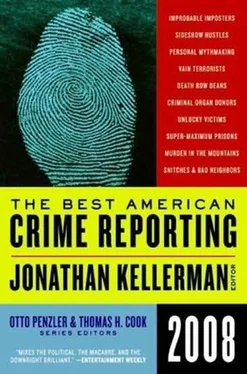There was no jury, only the judge, a woman from Rivas named Ivette Toruño Blanco. And the four initial suspects had been whittled down to two: Volz and Chamorro. On the day of the preliminary hearing in December, Llanes had shown up with his father and a lawyer and a paper showing he had been registering for classes on the day of the crime. After a closed-door meeting with the prosecutor he was let go. Charges against Lopez Dangla had also been dropped, and in an unlikely twist, he was now going to testify against Volz.
It appeared at first that Volz might have a fighting chance. The medical examiner and the police testified that there was no physical evidence linking Volz to the killing. None of the 100-plus hair samples matched his. There was no semen found in Jimenez’s body, but because she had been embalmed, a full examination was not performed. And the only blood found at the crime scene besides Jimenez’s was type O. Volz is type A. Also, Volz had signed credit card receipts for the rental car; the contract was printed at 3:11 PM. The only physical evidence the prosecution presented regarding Volz was photos of scratches on his back. (He claims they were from carrying Jimenez’s casket.)
Soon it was clear that this was not going to be an orderly, Law & Order -style trial, but more of a theatrical performance. After she finished answering questions, Sobalvarro announced dramatically that Jimenez had confided that Volz had threatened to kill her if she went with another man. Jimenez’s mother echoed that statement, adding that Volz’s family had offered her $1 million to drop the charges against Volz, a claim Volz’s family adamantly denies. At one point during the trial gunshots were fired outside-apparently by police trying to control the crowds-and while the judge retreated to chambers, Alvarado launched an impromptu news conference.
Things became even more bizarre when Lopez Dangla took the stand. According to defense attorney Fabbrith Gomez, he was “visibly incoherent” and “agitated” during his testimony, continually pleading his innocence to the judge even though he was not on trial. Lopez Dangla said he had seen Volz coming out of the victim’s store at 1 PM, and that Volz had paid him about $3 to dispose of two black bags he was carrying. He did not mention Llanes. “I may be lazy and a drug user,” he said, “but I’m not a liar.” (Contacted by Men’s Journal , Lopez Dangla said he stands by his testimony.)
Volz sat patiently through the testimony, consciously controlling his body language. By U.S. standards he had an airtight defense. Records from cell phone towers showed that he was in Managua at the time of the murder, as did testimony from several witnesses, including Ricardo Castillo, who said he had lunch with Volz that day. Several others had also seen him, but the judge disqualified them because they worked for him.
On Friday, February 16, the third day of the trial, Judge Toruño Blanco reached her decision. In open court she either discounted or dismissed most of the defense’s evidence. She discredited the alibi witnesses, claiming they all had business relationships with the defendant, including the journalist Castillo. She dismissed the phone records saying there was no proof that Volz had actually made the calls. (The defense did not call witnesses who could confirm having spoken to Volz on his cell phone.)
She instead chose to accept Lopez Dangla’s testimony, despite the fact that he was incoherent on the stand and had everything to gain by testifying against Volz. The scratches on Volz’s shoulder constituted further proof that he had committed the crime, she said; no mention was made of Lopez Dangla’s numerous scratches. “Nelson Dangla and [another witness] have all the credibility necessary,” she asserted. She found Volz and Chamorro both guilty.
Volz stood blinking in disbelief. “Once I heard the initial part of the verdict, I stopped paying attention,” says Volz. “I immediately started preparing for what was next. It was back to survival mode, focusing all my energy on staying alive.”
FOLLOWING HIS CONVICTION Volz was sent to the El Modelo maximum-security facility. After fighting with his first roommate, he was paired with a 35-year-old man convicted of attempting to murder his wife. “He keeps the place clean, he respects personal space, he doesn’t use drugs, and he’s not gay,” says Volz. “It’s a good situation.”
His parents have hired someone to bring him fresh vegetables and water to supplement the single plate of rice and beans he’s allotted each day. Once a week he gets two hours in the yard; he spends the whole time running. He does yoga stretches in the morning and uses meditation and visualization to try to keep himself centered. “I don’t really have time to spend with the other prisoners,” he says. “Prison is a time to self-explore and really try to make sense of it all.”
Volz isn’t the only one trying to make sense of things. His mother and stepfather Dane Anthony have launched a media campaign on his behalf, beginning with a website, friendsofericvolz.com, that’s regularly updated with news about his case, and lists of things that visitors can pray for if they choose.
The U.S. embassy is tight-lipped, but the embassy monitors his treatment in prison, and legal observers attended his trial. Volz’s lawyers have appealed the conviction, in the hope that-barring further lynch-mob shenanigans-cooler heads will prevail. (Chamorro has also appealed.) “I don’t think [the conviction] was politically motivated,” says Castillo. “This type of thing happens to a lot of Nicaraguans, and it’s really a problem. It needs to change.”
Then again, cooler heads might not prevail. The media campaign has stirred up a backlash in San Juan del Sur; one American journalist had his tires slashed, and a photographer was threatened-by an expat. Local opinion seems to have solidified against Volz. A recent headline in El Nuevo Diario condemned “Pure Lies From the Volz Family.” “I’d say about 85 percent of the Nicaraguans here think Eric Volz is guilty,” says one San Juan del Sur native. “Maybe more.”
To their minds, everything adds up. Volz and Jimenez had split, she was seeing someone else, and he was jealous. He also was said to show no emotion at the murder scene, which struck people as suspicious. He asked too many questions, acted too bossy, and dared to tangle with the cops, which any Nicaraguan knows is tempting fate. Something was up. And, finally, the judge found him guilty. “Justice was served,” says Jimenez’s mother.
In the short run some Nicaraguans might see the case as a victory against the rich Americans who are buying up the country, one quarter-acre beachfront lot at a time. “The locals are starting to realize how much money the gringos are making in Nicaragua,” says one expat. “I don’t think they really knew before. Maybe there is some animosity when a gringo buys land for $20K from a local and turns around and sells it for $50K to another gringo. The local made $20K for land they’ve owned their whole life and the gringo made $30K in five minutes. This has happened plenty, and I’m sure the locals have felt ripped off as a result.”
“I think locals are starting to realize that they’re getting left behind,” Volz agrees. “There’s been more crimes and other things that seem related to the social inequity. I think there’s an underlying tone to the whole real estate boom, and me being a member of that community working for Century 21. They just chose to see this so-called privileged, moneyed real estate guy.”
Volz is annoyed that fellow expats are keeping quiet about his case; he thinks they’re afraid to spoil their budding boomtown, which local real estate websites liken to Cancun in the ’60s. There are miles of unspoiled coastline waiting to be snapped up. One day there will be highways and condos, and the pristine kilometer-long beach that’s listed for $2 million will seem like an incredible bargain. Or so they hope.
Читать дальше












